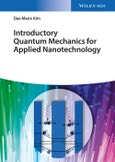The book provides a brief review of classical and statistical mechanics and electromagnetism, and then turns to the quantum treatment of atoms, molecules, and chemical bonds.
Aiming at senior undergraduate and graduate students in nanotechnology related areas like physics, materials science, and engineering, the book could be used at schools that offer interdisciplinary but focused training for future workers in the semiconductor industry and for the increasing number of related nanotechnology firms, and even practicing people could use it when they need to learn related concepts.
The author is Professor Dae Mann Kim from the Korea Institute for Advanced Study who has been teaching Quantum Mechanics to engineering, material science and physics students for over 25 years in USA and Asia.
Table of Contents
Preface XI
1 Review of Classical Theories 1
1.1 Harmonic Oscillator 1
1.2 Boltzmann Distribution Function 3
1.3 Maxwell’s Equations and EMWaves 6
Suggested Readings 11
2 Milestones Leading to Quantum Mechanics 13
2.1 Blackbody Radiation and Quantum of Energy 13
2.2 Photoelectric Effect and Photon 14
2.3 Compton Scattering 16
2.4 de BroglieWavelength and Duality of Matter 17
2.5 Hydrogen Atom and Spectroscopy 18
Suggested Readings 22
3 SchrödingerWave Equation 23
3.1 Operator Algebra and Basic Postulates 23
3.2 Eigenequation, Eigenfuntion and Eigenvalue 24
3.3 Properties of Eigenfunctions 25
3.4 Commutation Relation and Conjugate Variables 27
3.5 Uncertainty Relation 29
Suggested Readings 31
4 Bound States in QuantumWell and Wire 33
4.1 Electrons in Solids 33
4.2 1D, 2D, and 3D Densities of States 35
4.3 Particle in QuantumWell 38
4.4 QuantumWell andWire 40
Suggested Readings 43
5 Scattering and Tunneling of 1D Particle 45
5.1 Scattering at the Step Potential 45
5.2 Scattering from a QuantumWell 48
5.3 Tunneling 50
5.3.1 Direct and Fowler–Nordheim Tunneling 52
5.3.2 Resonant Tunneling 53
5.4 The Applications of Tunneling 56
5.4.1 Metrology and Display 57
5.4.2 Single-Electron Transistor 58
Suggested Readings 61
6 Energy Bands in Solids 63
6.1 BlochWavefunction in Kronig–Penney Potential 63
6.2 E–k Dispersion and Energy Bands 67
6.3 The Motion of Electrons in Energy Bands 70
6.4 Energy Bands and Resonant Tunneling 71
Suggested Readings 74
7 The Quantum Treatment of Harmonic Oscillator 75
7.1 Energy Eigenfunction and Energy Quantization 75
7.2 The Properties of Eigenfunctions 78
7.3 HO in Linearly Superposed State 81
7.4 The Operator Treatment of HO 83
7.4.1 Creation and Annihilation Operators and Phonons 84
Suggested Readings 86
8 Schrödinger Treatment of Hydrogen Atom 87
8.1 Angular Momentum Operators 87
8.2 Spherical Harmonics and Spatial Quantization 90
8.3 The H-Atom and Electron–Proton Interaction 93
8.3.1 Atomic Radius and the Energy Eigenfunction 97
8.3.2 Eigenfunction and Atomic Orbital 98
8.3.3 Doppler Shift 100
Suggested Readings 104
9 The Perturbation Theory 105
9.1 Time-Independent Perturbation Theory 105
9.1.1 Stark Effect in H-Atom 110
9.2 Time-Dependent Perturbation Theory 111
9.2.1 Fermi’s Golden Rule 113
Suggested Readings 116
10 System of Identical Particles and Electron Spin 117
10.1 Electron Spin 117
10.1.1 Pauli Spin Matrices 118
10.2 Two-Electron System 118
10.2.1 Helium Atom 120
10.2.2 Multi-Electron Atoms and Periodic Table 124
10.3 Interaction of Electron Spin with Magnetic Field 126
10.3.1 Spin–Orbit Coupling and Fine Structure 127
10.3.2 Zeeman Effect 129
10.4 Electron Paramagnetic Resonance 131
Suggested Readings 135
11 Molecules and Chemical Bonds 137
11.1 Ionized Hydrogen Molecule 137
11.2 H2 Molecule and Heitler-LondonTheory 141
11.3 Ionic Bond 144
11.4 van derWaals Attraction 146
11.5 Polyatomic Molecules and Hybridized Orbitals 148
Suggested Readings 150
12 Molecular Spectra 151
12.1 Theoretical Background 151
12.2 Rotational and Vibrational Spectra of Diatomic Molecule 154
12.3 Nuclear Spin and Hyperfine Interaction 158
12.4 Nuclear Magnetic Resonance (NMR) 161
12.4.1 Molecular Imaging 163
Suggested Readings 165
13 Atom–Field Interaction 167
13.1 Atom–Field Interaction: Semiclassical Treatment 167
13.2 Driven Two-Level Atom and Atom Dipole 169
13.3 Atom–Field Interaction: Quantum Treatment 171
13.3.1 Field Quantization 171
Suggested Readings 177
14 The Interaction of EMWaves with an Optical Media 179
14.1 Attenuation, Amplification, and Dispersion ofWaves 179
14.2 Atomic Susceptibility 181
14.3 Laser Device 185
14.3.1 Population Inversion 186
Suggested Readings 189
15 Semiconductor Statistics 191
15.1 Quantum Statistics 191
15.1.1 Bosons and Fermions 192
15.2 Carrier Concentration in Intrinsic Semiconductor 194
15.3 Carrier Densities in Extrinsic Semiconductors 197
15.3.1 Fermi Level in Extrinsic Semiconductors 199
Suggested Readings 201
16 Carrier Transport in Semiconductors 203
16.1 Quantum Description of Transport Coefficients 203
16.1.1 Mobility 204
16.1.2 Diffusion Coefficient 205
16.2 Equilibrium and Nonequilibrium 206
16.2.1 Nonequilibrium and Quasi-Fermi Level 208
16.3 Generation and Recombination Currents 209
16.3.1 Trap-Assisted Recombination and Generation 210
Suggested Readings 215
17 P–N Junction Diode: I–V Behavior and Device Physics 217
17.1 The p–n Junction in Equilibrium 217
17.2 The p–n Junction under Bias 220
17.3 Ideal Diode I–V Behavior 223
17.4 Nonideal I–V Behavior 226
Suggested Readings 229
18 P–N Junction Diode: Applications 231
18.1 Optical Absorption 231
18.2 Photodiode 233
18.3 Solar Cell 235
18.4 LED and LD 238
Suggested Readings 243
19 Field-Effect Transistors 245
19.1 The Modeling of MOSFET I–V 245
19.1.1 Channel Inversion in NMOS 246
19.1.2 Threshold Voltage and ON Current 250
19.1.3 Subthreshold Current ISUB 251
19.2 Silicon Nanowire Field-Effect Transistor 252
19.2.1 Short-Channel I–V Behavior in NWFET 256
19.2.2 Ballistic NWFET 257
19.3 Tunneling NWFET as Low-Power Device 259
Suggested Readings 262
20 The Application and Novel Kinds of FETs 263
20.1 Nonvolatile Flash EEPROM Cell 263
20.2 Semiconductor Solar Cells 266
20.3 Biosensor 268
20.4 Spin Field-Effect Transistor 271
20.5 Spin Qubits and Quantum Computing 273
Suggested Readings 278
Solutions 279
Index 369
Important Physical Numbers and Quantities 377








